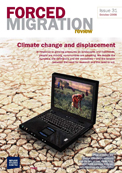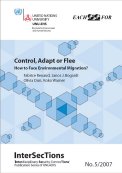UNHCR organized an expert roundtable on climate change and displacement, which was held in Bellagio, Italy, from 22 to 25 February 2011, with the support of the Rockefeller Foundation.
Main messages to come out of the event included:
- Displacement is likely to be a significant consequence of global climate change processes of both a rapid and slow-onset nature, but there is a need for better understanding and research of these processes as well as the impacts and scale of displacement related to climate change.
- Responses to climate-related displacement need to be guided by the fundamental principles of humanity, human dignity, human rights and international cooperation. They need furthermore to be guided by consent, empowerment, participation and partnership and to reflect age, gender and diversity aspects.
- While the 1951 Convention and some regional refugee instruments provide answers to certain cases of external displacement related to climate change, and these ought to be analyzed further, they are limited.
- The terms of “climate refugee” and “environmental refugee” should be avoided as they are inaccurate and misleading.
- There is a need to develop a global guiding framework or instrument to apply to situations of external displacement other than those covered by the 1951 Convention, especially displacement resulting from sudden-onset disasters. States, together with UNHCR and other international organizations, are encouraged to explore this further. Consideration would need to be given to whether any such framework or instrument ought also to cover other contemporary forms of external displacement.
- The Guiding Principles on Internal Displacement, as a reflection of existing to situations of internal displacement caused by climate-related processes. Thus, there is no need for a new set of principles in relation to internal displacement in the context of climate change.
- Although designed to address internal displacement, the Guiding Principles on Internal Displacement contain a number of principles that may be applicable in external displacement situations. In addition, there are other relevant standards – for example, those developed in response to mass influx of refugees – which could be
considered.
- Climate-related displacement – both internal and external – is likely to take different forms and to require diverse responses at national, sub-regional, regional and international levels to address the specificities of different situations, guided by basic universal principles.
- National legislation, policies and institutions are central to developing appropriate responses to both the internal and external dimensions of climate-related displacement.
- Pre-existing regional and sub-regional governance forums and arrangements, including mechanisms promoting free movement, could be explored further to determine the extent to which they apply to climate-related displacement and migration.
- In relation to small island and/or
low-lying coastal states, the legal presumption of continuity of statehood needs to be emphasized and the notion and language that such states will “disappear” (i.e., lose their international legal personality) or “sink” ought to be avoided.
- Migration is widely acknowledged as a rational adaptation strategy to climate change processes and needs to be supported as such.
- Given the magnitude of the issues involved, there is a need for a collaborative approach based on principles of international cooperation and burden- and responsibility-sharing. UNHCR’s expertise on the protection dimensions of displacement makes it a particularly valuable actor.



